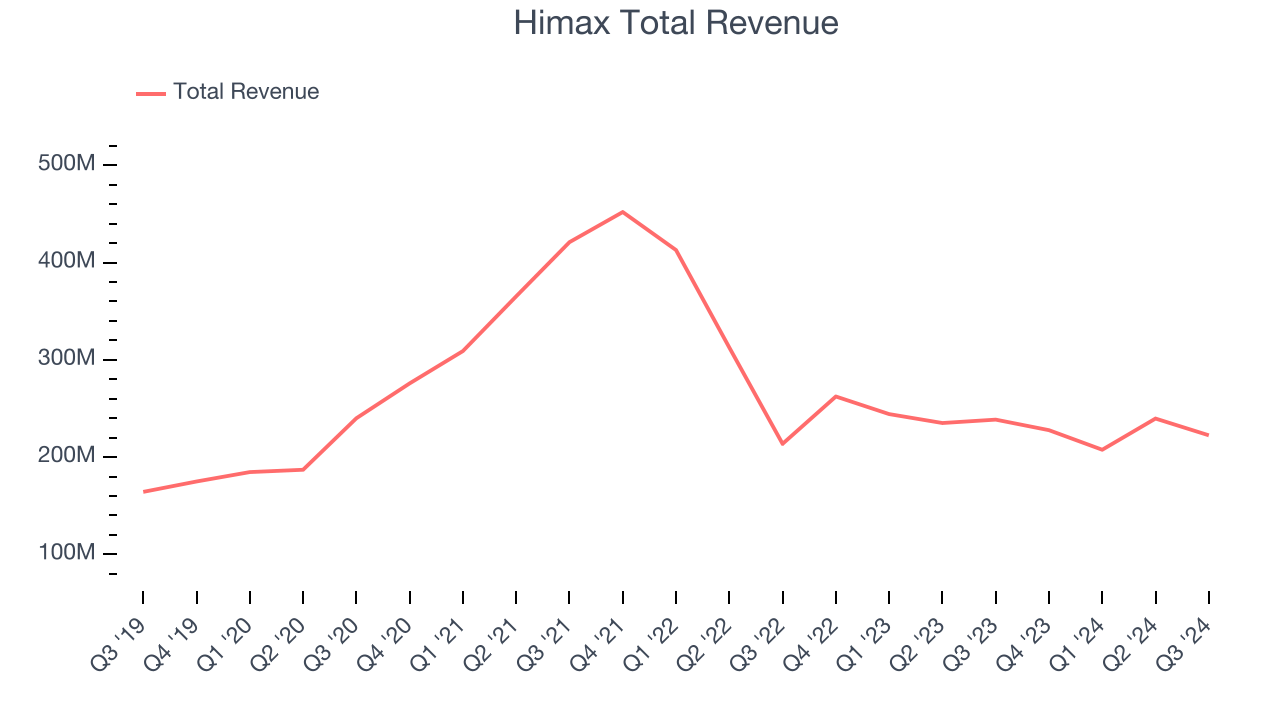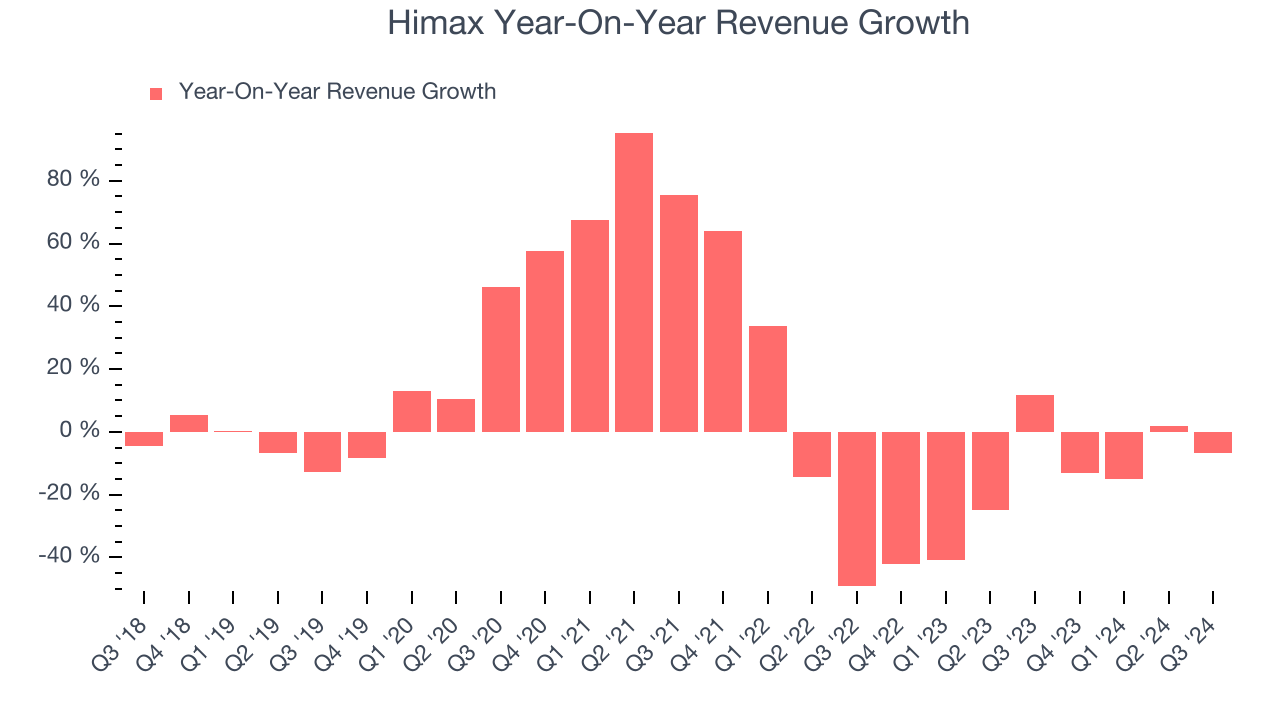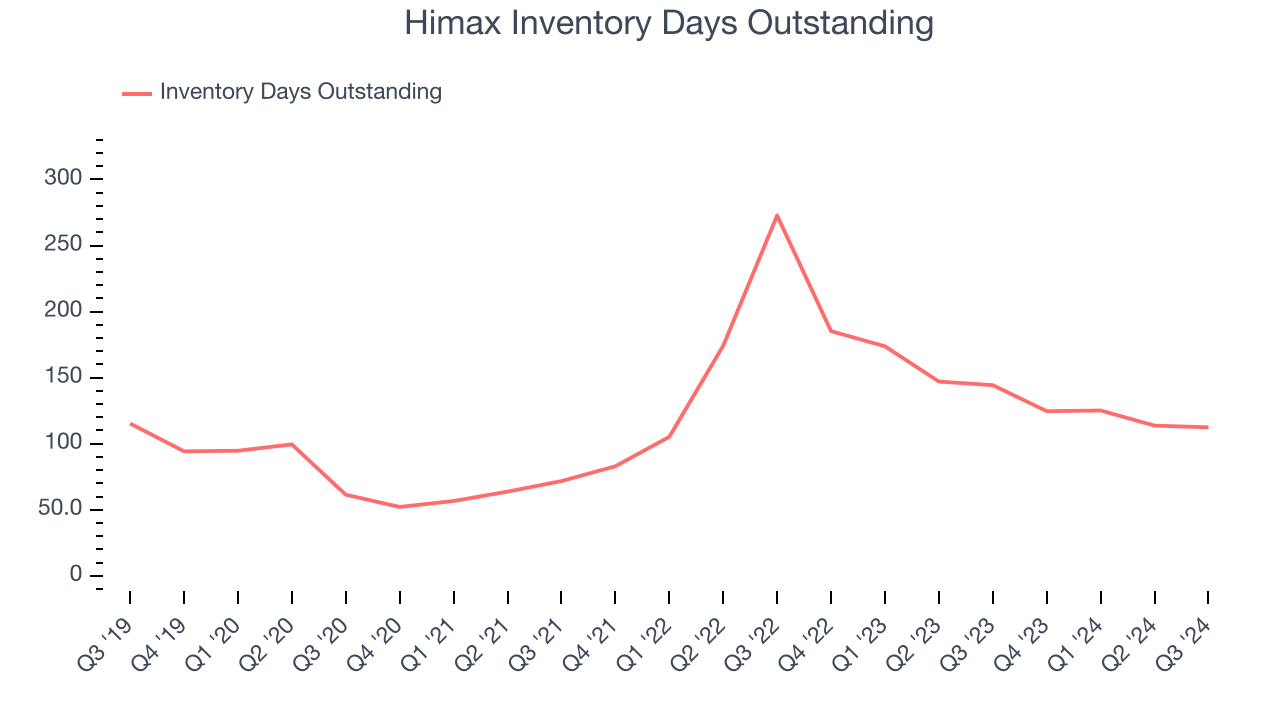
Semiconductor maker Himax Technologies (NASDAQ: HIMX) beat Wall Street’s revenue expectations in Q3 CY2024, but sales fell 6.8% year on year to $222.4 million. Its GAAP profit of $0.07 per share was in line with analysts’ consensus estimates.
Is now the time to buy Himax? Find out by accessing our full research report, it’s free.
Himax (HIMX) Q3 CY2024 Highlights:
- Revenue: $222.4 million vs analyst estimates of $220 million (1.1% beat)
- EPS (GAAP): $0.07 vs analyst estimates of $0.07 (in line)
- Gross Margin (GAAP): 30%, down from 31.4% in the same quarter last year
- Inventory Days Outstanding: 112, down from 114 in the previous quarter
- Operating Margin: 2.6%, down from 4.6% in the same quarter last year
- EBITDA Margin: 5.4%, down from 7.1% in the same quarter last year
- Free Cash Flow was -$3.87 million, down from $13.42 million in the same quarter last year
- Market Capitalization: $1.04 billion
“Looking ahead to Q4, the macro environment remains challenging. Against this backdrop, we continue to strictly manage expenses and implement various cost optimization measures, including enhancing manufacturing and operational efficiency, as well as leveraging a diverse range of vendors in foundries and backend suppliers. Looking ahead, while the global economy still looks uncertain, we are confident in the business outlook of several key areas, namely automotive, AI, WLO, and OLED, and expect these product lines to drive significant growth of our business,” said Mr. Jordan Wu, President and Chief Executive Officer of Himax.
Company Overview
Taiwan-based Himax Technologies (NASDAQ: HIMX) is a leading manufacturer of display driver chips and timing controllers used in TVs, laptops, and mobile phones.
Analog Semiconductors
Demand for analog chips is generally linked to the overall level of economic growth, as analog chips serve as the building blocks of most electronic goods and equipment. Unlike digital chip designers, analog chip makers tend to produce the majority of their own chips, as analog chip production does not require expensive leading edge nodes. Less dependent on major secular growth drivers, analog product cycles are much longer, often 5-7 years.
Sales Growth
Examining a company’s long-term performance can provide clues about its business quality. Any business can put up a good quarter or two, but the best consistently grow over the long haul. Regrettably, Himax’s sales grew at a tepid 5.5% compounded annual growth rate over the last five years. This shows it failed to expand in any major way, a rough starting point for our analysis. Semiconductors are a cyclical industry, and long-term investors should be prepared for periods of high growth followed by periods of revenue contractions.

We at StockStory place the most emphasis on long-term growth, but within semiconductors, a half-decade historical view may miss new demand cycles or industry trends like AI. Himax’s history shows it grew in the past but relinquished its gains over the last two years, as its revenue fell by 19.7% annually. 
This quarter, Himax’s revenue fell 6.8% year on year to $222.4 million but beat Wall Street’s estimates by 1.1%.
Looking ahead, sell-side analysts expect revenue to decline 5% over the next 12 months. While this projection is better than its two-year trend it's hard to get excited about a company that is struggling with demand.
Today’s young investors won’t have read the timeless lessons in Gorilla Game: Picking Winners In High Technology because it was written more than 20 years ago when Microsoft and Apple were first establishing their supremacy. But if we apply the same principles, then enterprise software stocks leveraging their own generative AI capabilities may well be the Gorillas of the future. So, in that spirit, we are excited to present our Special Free Report on a profitable, fast-growing enterprise software stock that is already riding the automation wave and looking to catch the generative AI next.
Product Demand & Outstanding Inventory
Days Inventory Outstanding (DIO) is an important metric for chipmakers, as it reflects a business’ capital intensity and the cyclical nature of semiconductor supply and demand. In a tight supply environment, inventories tend to be stable, allowing chipmakers to exert pricing power. Steadily increasing DIO can be a warning sign that demand is weak, and if inventories continue to rise, the company may have to downsize production.

This quarter, Himax’s DIO came in at 112, which is 5 days below its five-year average. At the moment, these numbers show no indication of an excessive inventory buildup.
Key Takeaways from Himax’s Q3 Results
It was encouraging to see Himax narrowly top analysts’ revenue expectations this quarter. Overall, this was a decent quarter. The stock traded up 4.5% to $6.22 immediately following the results.
Should you buy the stock or not? If you’re making that decision, you should consider the bigger picture of valuation, business qualities, as well as the latest earnings. We cover that in our actionable full research report which you can read here, it’s free.



